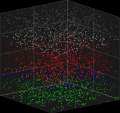Computing is any goal-oriented activity requiring, benefiting from, or creating computing machinery. It includes the study and experimentation of algorithmic...
52 KB (5,443 words) - 20:14, 25 July 2025
concert to perform very large tasks. Fog computing – Distributed computing paradigm that provides data, compute, storage and application services closer...
71 KB (7,496 words) - 21:28, 27 July 2025
Computer (redirect from Computing device)
of the analytical engine's computing unit (the mill) in 1888. He gave a successful demonstration of its use in computing tables in 1906. In his work...
140 KB (14,116 words) - 06:41, 28 July 2025
Computer science (redirect from Computing science)
and databases. In the early days of computing, a number of terms for the practitioners of the field of computing were suggested (albeit facetiously) in...
72 KB (6,671 words) - 02:53, 17 July 2025
information in quantum computing, the qubit (or "quantum bit"), serves the same function as the bit in ordinary or "classical" computing. However, unlike a...
114 KB (12,509 words) - 15:55, 1 August 2025
Church–Turing thesis conjectures that there is no effective model of computing that can compute more mathematical functions than a Turing machine. Computer scientists...
21 KB (3,293 words) - 20:34, 1 June 2025
Semantic computing is a field of computing that combines elements of semantic analysis, natural language processing, data mining, knowledge graphs, and...
2 KB (210 words) - 19:04, 14 June 2024
components of a computing platform may be obfuscated under layers of abstraction, the summation of the required components comprise the computing platform....
10 KB (973 words) - 16:42, 8 July 2025
successor. Reversible computing is considered an unconventional approach to computation and is closely linked to quantum computing, where the principles...
25 KB (3,014 words) - 19:02, 27 June 2025
Optical computing or photonic computing uses light waves produced by lasers or incoherent sources for data processing, data storage or data communication...
31 KB (3,449 words) - 10:00, 21 June 2025
Unconventional computing (also known as alternative computing or nonstandard computation) is computing by any of a wide range of new or unusual methods...
43 KB (4,694 words) - 17:07, 3 July 2025
common goal for their work. The terms "concurrent computing", "parallel computing", and "distributed computing" have much overlap, and no clear distinction...
57 KB (6,618 words) - 13:24, 24 July 2025
characteristic that differentiates cloud computing from previously proposed distributed computing paradigms, such as grid computing. The dynamic adaptation of capacity...
11 KB (1,395 words) - 07:06, 26 May 2025
Edge computing is a distributed computing model that brings computation and data storage closer to the sources of data. More broadly, it refers to any...
23 KB (2,465 words) - 07:00, 30 June 2025
computing platforms, as well as from any of these to any other of these. Software and hardware represent different levels of abstraction in computing...
14 KB (1,379 words) - 17:44, 16 July 2025
Native describes a computing system as operating directly with an underlying technology; with no intervening communication or translation layers. Native...
4 KB (370 words) - 20:40, 27 April 2025
Lateral computing is a lateral thinking approach to solving computing problems. Lateral thinking has been made popular by Edward de Bono. This thinking...
32 KB (4,213 words) - 07:44, 20 July 2025
processor that can scale to even larger systems. Rigetti Computing is a full-stack quantum computing company, a term that indicates that the company designs...
10 KB (852 words) - 15:19, 7 July 2025
Dew computing is an information technology (IT) paradigm that combines the core concept of cloud computing with the capabilities of end devices (personal...
12 KB (1,345 words) - 00:19, 3 March 2025
parallel computing: bit-level, instruction-level, data, and task parallelism. Parallelism has long been employed in high-performance computing, but has...
74 KB (8,380 words) - 19:27, 4 June 2025
traditional hard-computing algorithms heavily rely on concrete data and mathematical models to produce solutions to problems. Soft computing was coined in...
12 KB (1,324 words) - 00:28, 24 June 2025
Petascale computing refers to computing systems capable of performing at least 1 quadrillion (10^15) floating-point operations per second (FLOPS). These...
6 KB (559 words) - 14:28, 16 January 2025
Defensive computing is a form of practice for computer users to help reduce the risk of computing problems, by avoiding dangerous computing practices...
8 KB (1,078 words) - 15:07, 25 January 2024
Grid computing is the use of widely distributed computer resources to reach a common goal. A computing grid can be thought of as a distributed system...
45 KB (4,756 words) - 17:14, 28 May 2025
Volunteer computing is a type of distributed computing in which people donate their computers' unused resources to a research-oriented project, and sometimes...
16 KB (1,814 words) - 15:24, 12 July 2025
Ubiquitous computing (or "ubicomp") is a concept in software engineering, hardware engineering and computer science where computing is made to appear seamlessly...
20 KB (1,981 words) - 06:26, 23 May 2025
Mobile computing is human–computer interaction in which a computer is expected to be transported during normal usage and allow for transmission of data...
25 KB (2,687 words) - 10:20, 28 May 2025
Urban computing is an interdisciplinary field which pertains to the study and application of computing technology in urban areas. This involves the application...
24 KB (2,912 words) - 02:22, 21 December 2024
customer data. Serverless computing represents a form of virtualized computing." according to ISO/IEC 22123-2. Serverless computing is a broad ecosystem that...
16 KB (1,748 words) - 14:46, 29 July 2025
Affective computing is the study and development of systems and devices that can recognize, interpret, process, and simulate human affects. It is an interdisciplinary...
56 KB (6,464 words) - 03:36, 30 June 2025











